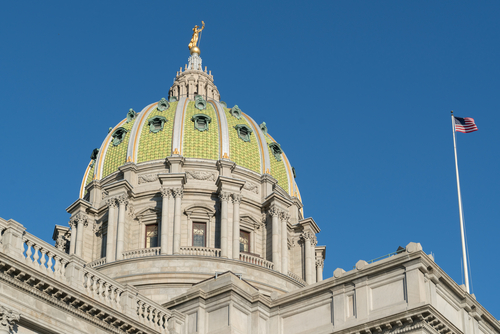
The Pennsylvania House Republican Policy Committee held a hearing on April 11 at the Columbia-Montour Chamber of Commerce to discuss how to foster economic growth through business-related tax reform.
“I firmly believe in fostering an environment that encourages economic growth and prosperity for the people of Pennsylvania,” committee Chairman Josh Kail (R-Beaver/Washington), said. “Making our state business-friendly is not just a goal; it’s a fundamental necessity. At the end of the day, the most important thing is ensuring our Commonwealth has opportunity for family-sustaining jobs so that my kids and future generations don’t have to go elsewhere to achieve strong quality of life.”
“A competitive business environment attracts investment, encourages innovation, and stimulates entrepreneurship, all of which are essential for sustained prosperity in Pennsylvania,” state Rep. Robert Leadbeter (R-Columbia) said. “Unfortunately, Pennsylvania’s taxes are punitive and in serious need of reform. Local businesses drive the economic success of Pennsylvania, especially here in Columbia County, but there cannot be success with burdensome taxes. We must develop a job-creating tax reform solution for current and future businesses.”
Testifying at the hearing, called Job-Creating Tax Reform, were Chris Berleth, Columbia Montour Chamber of Commerce president; Steve Hall, Arconic state tax manager; Neal Lesher, PA Chamber of Business and Industry director of government affairs; and Carl Marrara, Pennsylvania Manufacturers’ Association (PMA) executive director.
The testifiers requested an immediate reduction in the Corporate Net Income Tax of 8.99 percent, which is the second highest in the country, and requested removing the cap on the Net Operating Loss carryforward deduction, the amount a company can offset against its current corporate net income. Pennsylvania is currently one of two states that caps deductions below the federal limit of 80 percent of taxable income. Pennsylvania caps at 40 percent. Other states use the federal standard or allow for 100 percent carryforwards.
Marrara highlighted how Pennsylvania is at a disadvantage compared to other states:
Pennsylvania’s share of the U.S. economy dropped from 3.8 percent in 2018 to 3.53 percent during the third quarter of 2023.
Labor force participation in Pennsylvania is 60.8 percent, ranking it 33rd in the United States.
The state’s population is eighth oldest by median age, and the state’s overall population also is declining.
“Especially on paper, published tax rates matter and greatly influence site selectors when the next major plant, warehouse, office or headquarters is being considered,” Marrara said. “Overall, we have one of the least competitive corporate tax environments in the country. The commonwealth was ranked 41st out of 50 states in the recently released Tax Foundation’s Corporate Tax Rank; only nine states were listed as having a worse corporate tax environment. The two most glaring shortcomings in regard to Pennsylvania’s corporate taxes are: the highest flat-rate in the nation 8.99 percent (to be reduced to 4.99 percent in 2031) corporate net Income tax rate; and, a 40 percent cap on net operating loss.”
The PMA issued seven recommendations:
The association urges the acceleration of the lowering of the Corporate Net Income Tax. The association believes this will result in enhanced economic growth and an increase in state tax revenue.
In addition to removing the Net Operating Losses cap, remove the time limitation a business may carry forward a net operating loss. Pennsylvania allows 20 years of carryforward , but 20 states have no limit.
The association urges legislative opposition to any proposal including Mandatory Unitary Combined Reporting (MUCR), which has been litigious in other states and creates uncertainty for businesses. MUCR would make Pennsylvania less competitive, Marrara said, and have negative consequences on the state economy.
The association urges support for the Small Business Tax package that would allow for a reduction in the personal income tax, the accelerated repeal of sales tax prepayments, and Net Operating Losses at the personal income tax level, among other provisions.
The association urges the General Assembly oppose new, additional taxes on business inputs resulting in tax pyramiding. These include carbon taxes, cap-and-tax programs, excise taxes, gross receipts taxes, and severance taxes.
The association urges the House of Representatives to not consider House Bill 1773. The bill would quadruple the small business tax rate from 3.07 percent to 12 percent. Passage of the bill would be the most devastating blow to the state’s business development in the last three decades, Marrara said.
The association urges lawmakers to support the Taxpayer Protection Act. The bill would control state government spending to ensure the government does not grow at a rate higher than the private sector.
“When government spending grows faster than the private sector, it stifles private sector growth because it creates uncertainty when it comes to tax rates to make up for that deficit spending,” Marrara said.